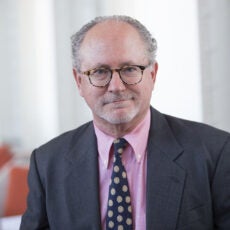
The Most Damnable Non Sequitur in History
The United States is advocating a pro-fossil fuel stance but this position hides behind science to draw the exact opposite policy conclusion that science suggests.
On Monday, P. Wells Griffith presented the official U.S. position on climate change policy at COP24 during an event that platformed fossil fuels. That position was summarized in Griffith’s simple statement, “We strongly believe that no country should have to sacrifice their economic prosperity or energy security in pursuit of environmental sustainability.”
We could parse the language of this statement (e.g., the tradeoff is false and economy, energy, and environment can mutually reinforce each other; and, environmental sustainability means survival, so dismissing it dooms every other policy consideration within a generation or two). But instead, let’s take the statement at face value and with a generous reading that he means what he appears to say.
What does it mean for the rest of us? We think it the most damnable non sequitur in history.
The fossil fuel event is only one part in a series of events at COP24 in Katowice Poland that has revealed a new coalition of fossil states that seek to push back on the Paris Agreement (COP21), including the U.S., Russia, Saudi Arabia, and Kuwait. The Paris Agreement calls for national emissions reductions to limit global warming to 3.6F degrees with an ambition to limit it to 2.7F degrees. Over the weekend preceding the U.S. fossil fuel party, this group of nations refused to accept the latest scientific report from the U.N. that presented how much worse the impacts of a 3.6F rise would be than a 2.7F rise and what energy changes are needed to keep warming to 2.7F. (The U.S. has also dismissed its own latest climate science report, released on the weekend after Thanksgiving.)
This emerging coalition of fossil states draw their policy conclusion from some otherwise reasonable observations: first, that the full deployment of a non-fossil-fuel energy system around the world will take time and effort; and second, that we will almost certainly need to invent and deploy new technologies to prevent and remove CO2 emissions in the atmosphere.
The policy conclusion that Griffith draws from these realities is that the U.S. should burn an unlimited amount of oil, coal, and natural gas. This is a stunning non sequitur. In order to get to an “unlimited burn” policy conclusion, you need to lay out whole set of additional observations: that the U.S. and other fossil states hold huge reserves of hydrocarbons, can continue to maximize private profits from those resources, and can hoard some of those profits to further national interests such as surviving a warmer, wetter future. And that is what makes this “unlimited burn” non sequitur so damnable. It hides national greed behind international science to draw the exact opposite policy conclusion that science suggests.
The less nationalistic (and less authoritarian) policy conclusions from the reasonable observations about renewable energy integration and carbon dioxide removal technologies are the very ones enshrined in the Paris Agreement. We will continue to burn some oil, coal, and gas for a couple more decades. But that burn should be limited to the goals of the Paris Agreement, because every ton of CO2 avoided is one less we have to replace with renewables or remove with technology. Continued fossil fuel use can only be justified as a limited transition to a just and efficient net-zero energy system.
Under Griffith’s policy conclusion, the nations of the world will divide into fossil states and all the others. The resulting climate consequences will threaten every nation on earth. That is exactly the world the U.S. announced on Monday.
Mark Alan Hughes
Director EmeritusMark Alan Hughes is director emeritus of the Kleinman Center. During his time as faculty director, he led the Center and wrote on topics ranging from deep decarbonization to the future of Philadelphia’s energy landscape.
Cornelia Colijn
Executive DirectorCornelia Colijn is the executive director of the Kleinman Center. She envisions, plans, and manages all center programming, while building connections with students, faculty, and leaders in the energy industry.


